Key takeaways:
- Data quality is vital for informed decision-making, fostering team confidence and accountability while optimizing project outcomes.
- Implementing data governance frameworks and defining metrics such as accuracy, completeness, and consistency is essential for maintaining high data integrity.
- Regular data audits and training teams on data quality enhance collaboration and empower individuals to take ownership of data contributions.
- Utilizing data quality tools, like profiling and cleansing applications, transforms how teams engage with data and improves overall accuracy.
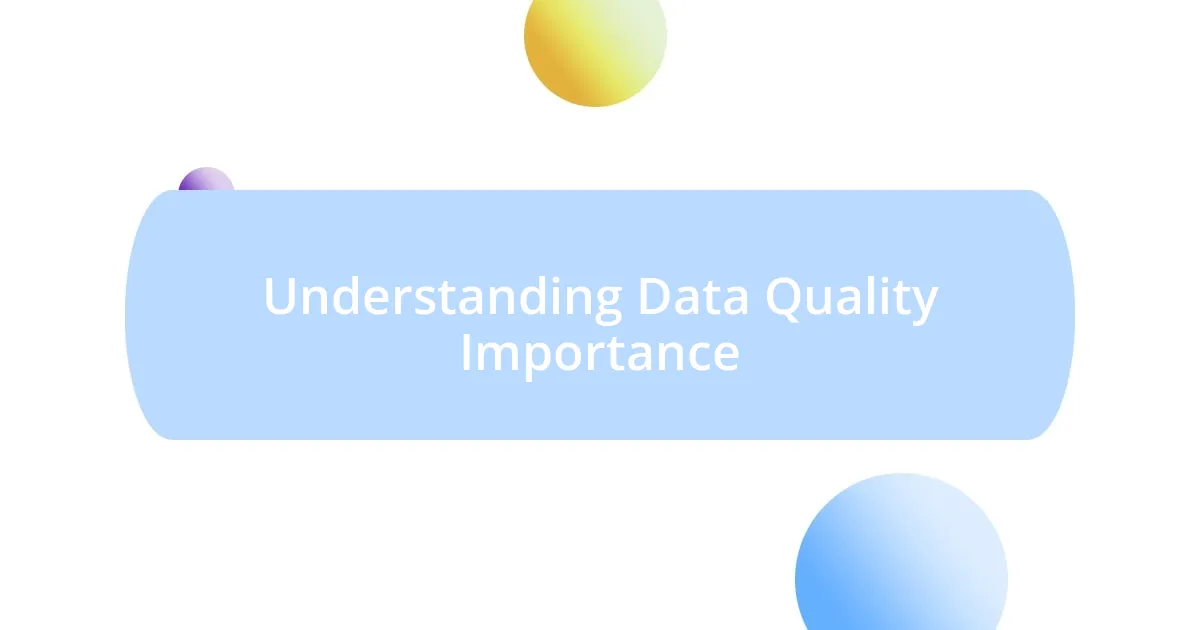
Understanding Data Quality Importance
Data quality plays a pivotal role in decision-making processes. I recall a time when I worked on a project that relied heavily on inaccurate data. It was frustrating to see how poor quality could derail initiatives, leading to wasted resources and uninformed choices. Have you ever faced similar challenges?
When data is trustworthy, it fuels confidence within a team, ensuring that every decision is grounded in solid evidence. I remember leading a strategy session where everyone had different opinions, but when we leaned on high-quality data, it became the backbone of our discussion. It’s interesting how that single source of truth could harmonize various perspectives, isn’t it?
Moreover, the implications of data quality extend beyond just immediate projects. I’ve found that organizations that prioritize data integrity often foster a culture of accountability and transparency. It’s heartening to see how a commitment to quality not only enhances outcomes but also empowers individuals to take ownership of their roles. Have you considered how data quality impacts your workplace environment?
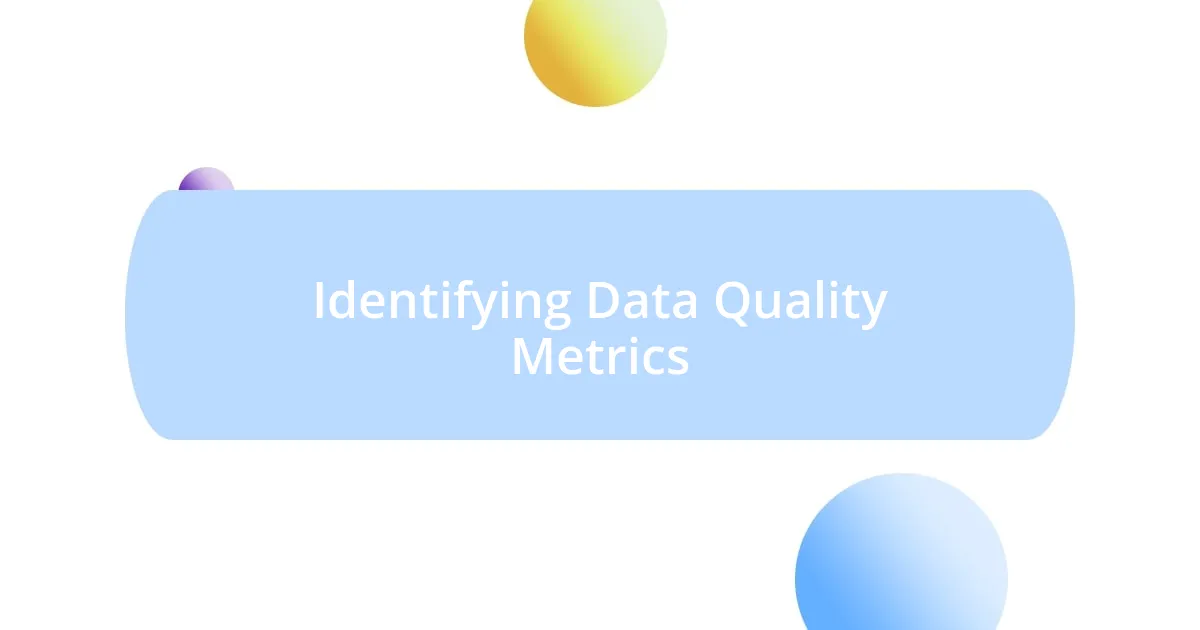
Identifying Data Quality Metrics
Identifying the right data quality metrics is crucial for tracking how effectively our data meets its intended goals. I always start by thinking about what dimensions matter most. For example, I’m particularly attuned to aspects like accuracy and completeness because, during one project, I discovered a shocking number of missing entries. It was a stark reminder of how essential it is to define these metrics upfront before diving into analysis.
Here are some key data quality metrics to consider:
- Accuracy: Measures how closely data aligns with reality or a trusted source.
- Completeness: Assesses whether all required data fields are filled and data is present.
- Consistency: Looks for uniformity across data sets, ensuring no conflicting information exists.
- Timeliness: Evaluates whether data is up-to-date and relevant for analysis.
- Relevance: Checks if the data collected serves its intended purpose and the needs of the project.
I rely on these metrics not only to ensure the data’s integrity but also to guide the team in making informed choices. Reflecting on these metrics has molded my approach to data management; I see them as a lifeline to clarity rather than just numbers on a report.
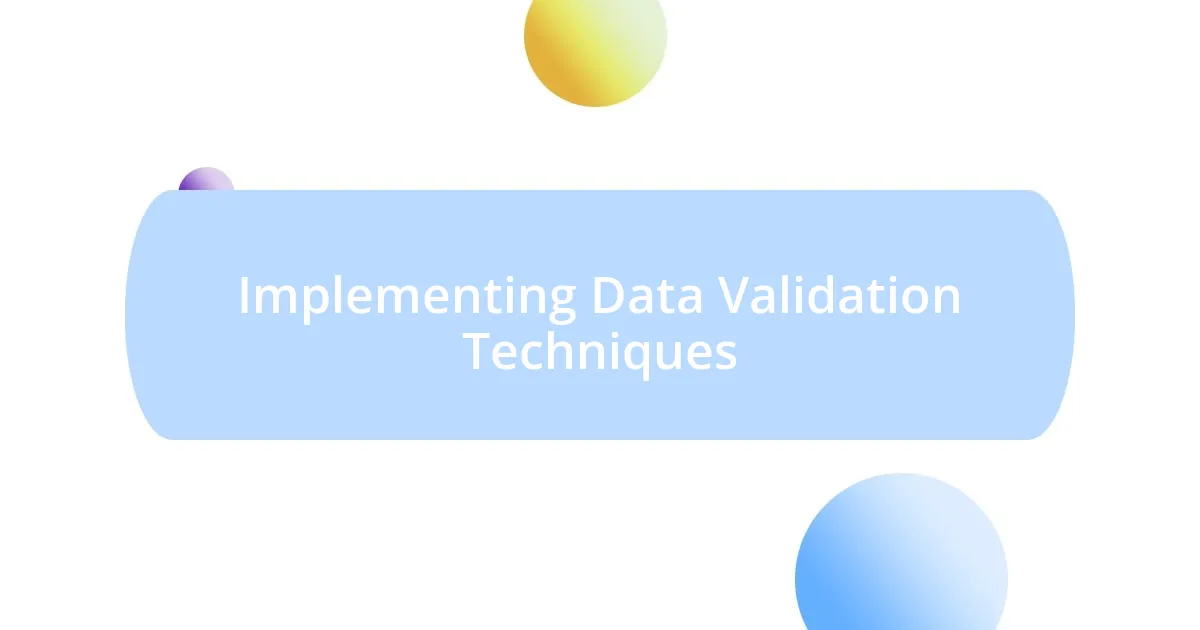
Implementing Data Validation Techniques
Implementing data validation techniques is essential for maintaining high data quality. One method I find particularly effective is the use of data entry forms that incorporate validation rules. For instance, during a quality assurance project, my team set up dropdown menus for specific fields, reducing the likelihood of errors. This not only simplified the user experience but also ensured that the data collected was uniform and valid from the start. Have you ever tried this approach in your projects?
Another strategy I frequently employ involves applying automated checks on existing data sets. I once worked with a large database where a simple script flagged anomalies, allowing us to identify incorrect entries. This proactive measure not only saved us from potential issues down the road but also built trust in the data we used for analysis. It’s fascinating how a few lines of code can bolster quality in such a significant way, don’t you think?
Manual review processes still hold their ground, too. I remember a time when a colleague and I painstakingly combed through datasets, looking for inconsistencies. While it was tedious, the thrill of uncovering errors added value to our analysis and brought us closer as a team. It reminds me that, sometimes, the human touch can catch what automated processes might miss, enhancing the overall data quality.
| Technique | Description |
|---|---|
| Data Entry Forms | Incorporating validation rules such as dropdown menus to minimize errors. |
| Automated Checks | Using scripts to flag anomalies in existing datasets for proactive quality management. |
| Manual Review | Conducting thorough checks to spot inconsistencies that automation may overlook. |
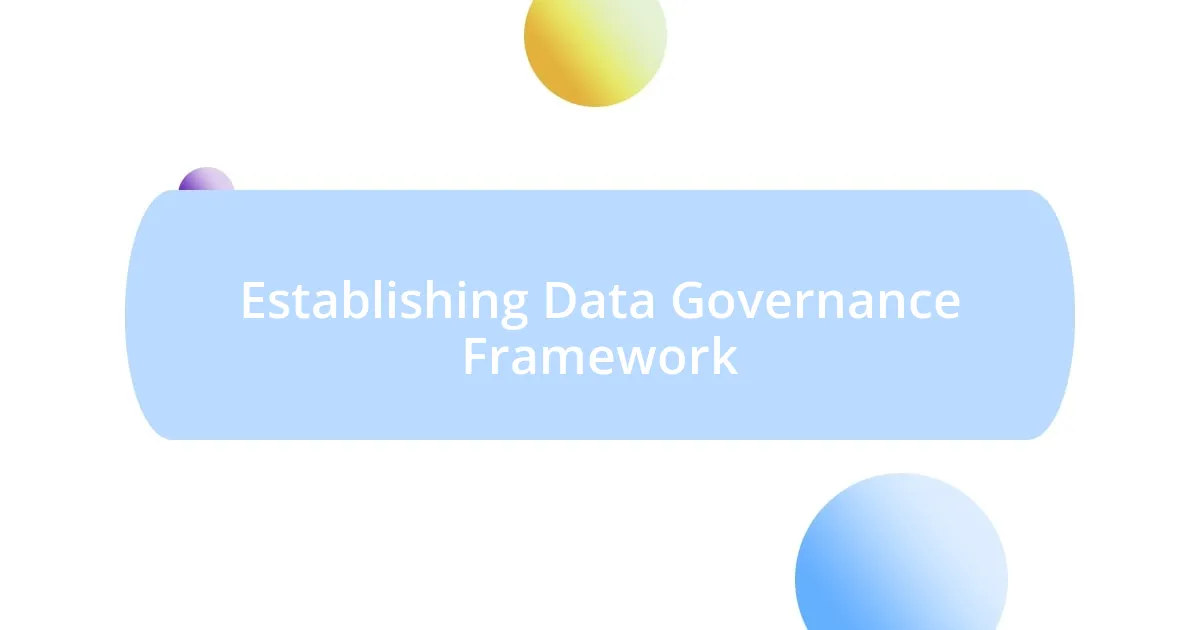
Establishing Data Governance Framework
Establishing a solid data governance framework is critical for ensuring data quality across any organization. I once spearheaded a project where we created a governance team that clearly defined roles and responsibilities. It was enlightening to see how well everyone understood their part in maintaining data integrity—different departments working in harmony, rather than in silos. Have you ever observed the chaos that ensues when there’s a lack of defined ownership?
To put this framework into action, I emphasized the importance of creating comprehensive policies outlining data standards and practices. For example, I remember drafting guidelines that mandated consistent data definitions and formats. This clarity helped my team avoid potential misunderstandings and miscommunications later on. It was a game changer for us—do you feel that having such structured policies could streamline your data processes too?
Training played a pivotal role in our governance framework. I distinctly recall leading workshops where we dove deep into the technical aspects of data quality, emphasizing not just “what” to do, but “why” it mattered. Witnessing my colleagues become more engaged and committed to data practices was incredibly rewarding. It’s amazing how equipping teams with knowledge can create a culture of accountability around data management—don’t you think empowering your team might enhance overall performance?
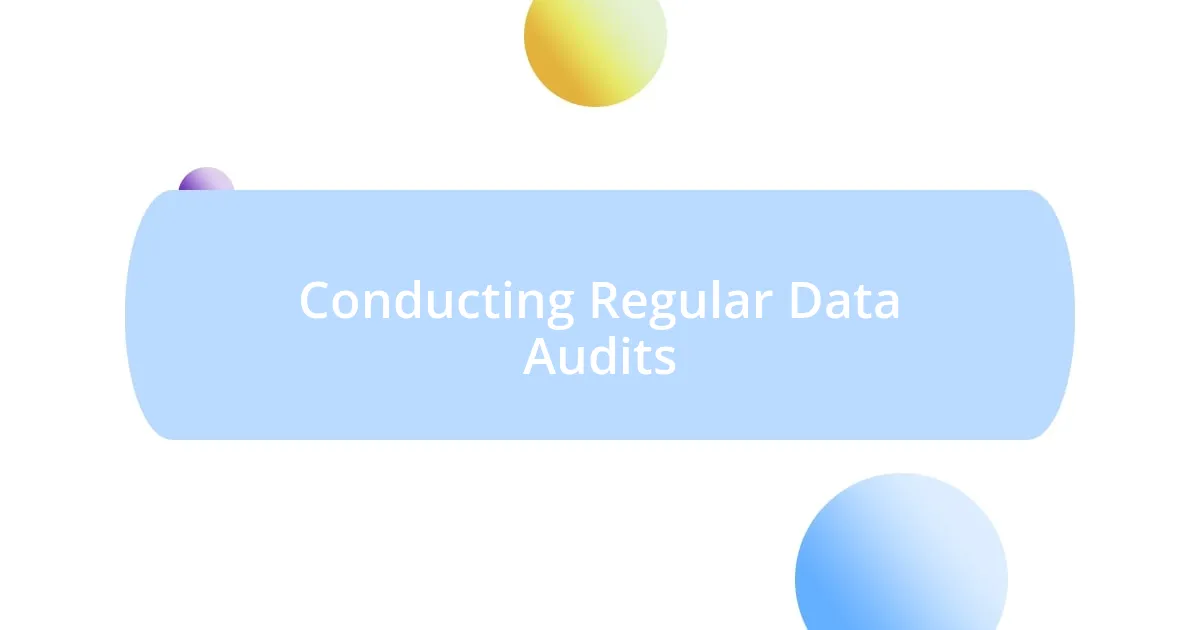
Conducting Regular Data Audits
Conducting regular data audits is something I prioritize deeply in my work. I remember the first time I implemented a quarterly audit for our customer database. The audit revealed several discrepancies, including duplicate entries that skewed our reports. It felt like unearthing hidden treasure, realizing that we could improve not just our data quality but also our decision-making processes. Have you ever found a simple audit revealing something significant?
As I continued with these audits, I noticed how they fostered a culture of accountability within my team. Each member felt a sense of ownership regarding their data contributions. It was gratifying to see them proactively cleaning up their work, knowing that our collective effort enhanced overall data quality. This collaboration transformed our work environment; everyone became more than just a data contributor—they became data stewards. Isn’t it empowering to see a team take pride in the integrity of their work?
Another vital aspect of the audits is the opportunity for continuous improvement. After each audit cycle, I would sit down with my team and analyze the findings. We would discuss what went well and what needed adjustments, leading to the development of more robust data management practices. I recall one particularly fruitful discussion where we identified a need for better training in data entry techniques. Implementing those insights not only increased our data quality but also strengthened team bonds. Have you considered how reflective practices can propel your data quality efforts forward?
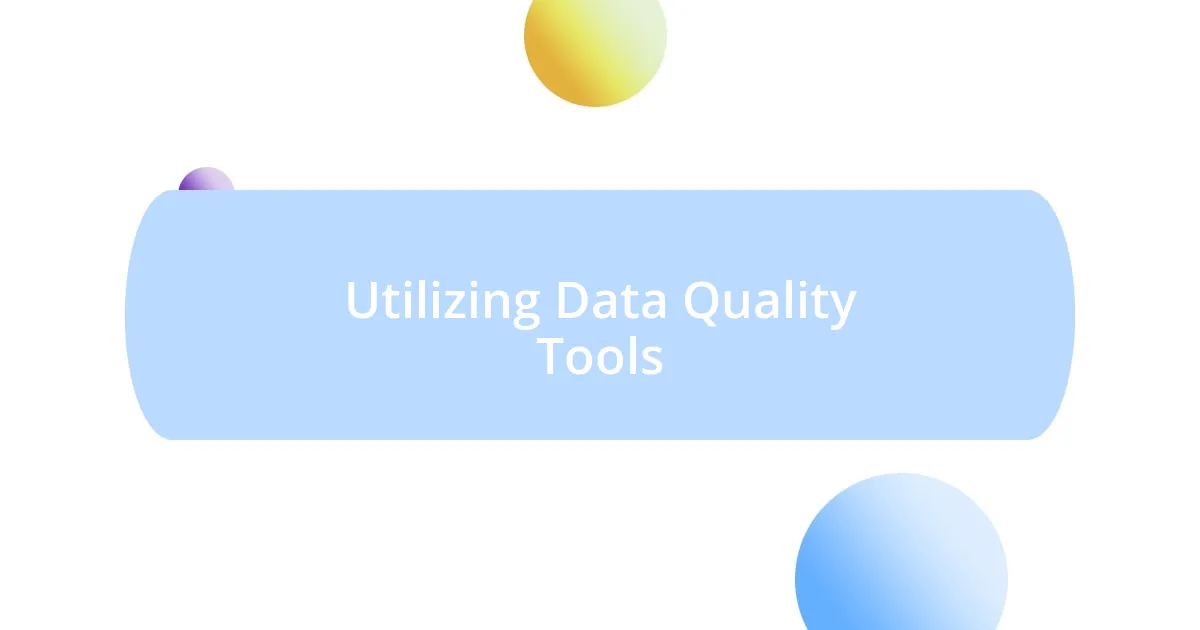
Utilizing Data Quality Tools
In my experience, leveraging data quality tools has been a game changer in maintaining accuracy and consistency across datasets. I vividly remember when we integrated a data profiling tool that provided me with insights into our data’s completeness and uniqueness. The moment I first saw the visualizations highlighting areas of concern, it was like receiving a wake-up call. Isn’t it intriguing to see how even a simple dashboard can illuminate data issues you never knew existed?
One tool that particularly stood out for me was a data cleansing application that automatically flagged erroneous records. I fondly recall the time it identified out-of-range values in our sales data; it not only saved us hours of manual checking but also enhanced our reporting accuracy. Knowing that we had reliable data at our fingertips made all the difference in how confident I felt presenting our metrics. Don’t you think having dependable data tools at your disposal could elevate your team’s decision-making?
Moreover, implementing data quality tools has empowered my team to engage actively with data management. The first time I conducted a training session to familiarize everyone with these tools, I was astonished by the enthusiasm it sparked. Colleagues who once hesitated to tackle data issues began sharing their own insights and discoveries. It made me realize that the right tools don’t just improve data—they transform how teams work together. Have you ever experienced that shift in engagement when everyone feels equipped to contribute?
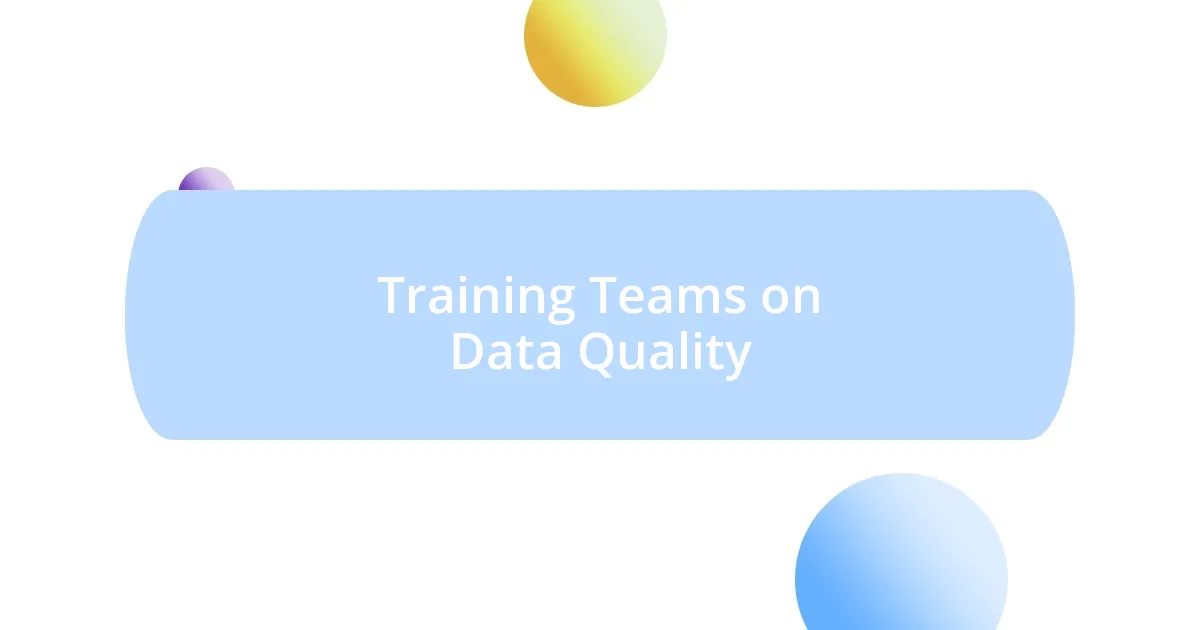
Training Teams on Data Quality
Training teams on data quality is crucial for fostering a culture of excellence. Reflecting on a recent workshop I conducted, I found that practical exercises significantly outperformed theoretical discussions. I introduced role-playing scenarios that mimicked real data entry situations. Witnessing my colleagues fully engaged, even laughing at their own mistakes, reminded me of the importance of making learning fun. Have you ever noticed how a light atmosphere encourages open communication about faults?
I also emphasize the importance of regular feedback loops after training sessions. One time, I implemented a quick follow-up survey to gather insights on how well the training resonated. To my surprise, many participants shared specific challenges they faced in their daily work. This feedback became a goldmine for me—I was able to tailor future training initiatives to directly address their concerns. Isn’t it fascinating how listening to your team can exponentially enhance their learning experience?
Most importantly, I strive to instill a sense of ownership among team members about data quality. I remember a young analyst who, after our data quality training, took the initiative to create a checklist for her daily tasks. She expressed how empowered she felt knowing that her attention to detail directly contributed to our team’s success. It was heartwarming to see her enthusiasm spread like wildfire, inspiring others to adopt similar practices. Have you ever witnessed the spark of motivation in someone after equipping them with the right skills?














